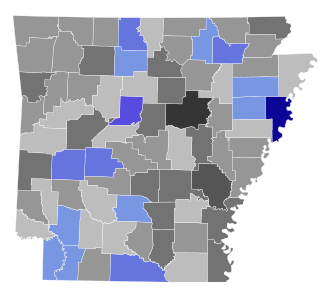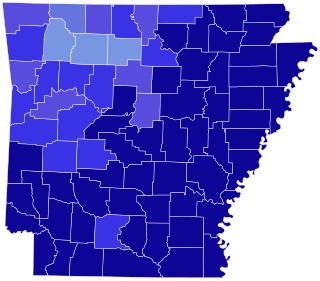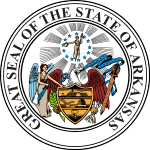
Hattie Ophelia Wyatt Caraway was an American politician who served in the United States Senate, representing Arkansas from 1931 to 1945. She was the first woman elected to serve a full term as a United States senator. She was the first woman to preside over the Senate. She won reelection to a full term in 1932 with the active support of fellow Senator Huey Long, of neighboring Louisiana.

Homer Martin Adkins was an American businessman and Democratic politician who served as the 32nd Governor of Arkansas. Adkins is remembered as a skilled retail politician and a strong states' rights proponent and social conservative who served as governor during a period when Arkansas departed from several national economic and societal trends. The Adkins administration fought federal influence in Arkansas during the post-New Deal era; successfully courting federal wartime production investment, during World War II, while battling the federal resettlement of Japanese-Americans in the state and Supreme Court civil rights decisions.

Harvey Parnell was an American farmer and politician from Southeast Arkansas. Parnell served in the Arkansas General Assembly for eight years, first in the Arkansas House of Representatives, and later serving a term in the Arkansas Senate. Following the re-establishment of the lieutenant governor position, Parnell won the statewide election and served under Governor John Martineau. When Martineau resigned to take a federal judgeship in March 1928, Parnell was elevated to become the state's 29th governor, a position he would hold until 1933. Early in his time as governor, Parnell was responsible for Progressive reforms popular with rural voters, including expansion and modernization of the highway system and public school reform. But as the Dust Bowl and Great Depression ravaged the Arkansas economy, Parnell's programs were blamed for bankrupting the state, and his popularity plummeted. He left politics after his second full gubernatorial term ended in January 1933.

Blanche Lambert Lincoln is an American politician who served as a United States Senator from Arkansas from 1999 to 2011. A member of the Democratic Party, she was first elected to the Senate in 1998; she was the first woman elected to the Senate from Arkansas since Hattie Caraway in 1932 and youngest woman ever elected to the Senate at age 38. She previously served in the U.S. House of Representatives, representing Arkansas's 1st congressional district from 1993 to 1997.

The 72nd United States Congress was a meeting of the legislative branch of the United States federal government, consisting of the United States Senate and the United States House of Representatives. It met in Washington, D.C. from March 4, 1931, to March 4, 1933, during the last two years of Herbert Hoover's presidency. The apportionment of seats in this House of Representatives was based on the 1910 United States census. The Senate had a Republican majority. The House started with a very slim Republican majority, but by the time it first met in December 1931, the Democrats had gained a majority through special elections.

The 1966 United States Senate elections were elections on November 8, 1966, for the United States Senate which occurred midway through the second term of President Lyndon B. Johnson. The 33 seats of Class 2 were contested in regular elections. Special elections were also held to fill vacancies. With divisions in the Democratic base over the Vietnam War, and with the traditional mid-term advantage of the party not holding the presidency, the Republicans took three Democratic seats, thereby breaking Democrats' 2/3rds supermajority. Despite Republican gains, the balance remained overwhelmingly in favor of the Democrats, who retained a 64–36 majority. Democrats were further reduced to 63–37, following the death of Robert F. Kennedy in June 1968.

The 1938 United States Senate elections occurred in the middle of Franklin D. Roosevelt's second term. The 32 seats of Class 3 were contested in regular elections, and special elections were held to fill vacancies. The Republicans gained eight seats from the Democrats, though this occurred after multiple Democratic gains since the 1932 election, leading to the Democrats retaining a commanding lead over the Republicans with more than two-thirds of the legislative chamber.

The 1932 United States Senate elections coincided with Democrat Franklin D. Roosevelt's landslide victory over incumbent Herbert Hoover in the presidential election. The 32 seats of Class 3 were contested in regular elections, and special elections were held to fill vacancies.

The Democratic Party of Arkansas is the affiliate of the Democratic Party in the state of Arkansas. The current party chair is Grant Tennille. Former U.S. president Bill Clinton was born in Arkansas, and served as state governor from 1979 to 1981 and 1983 to 1992.

The 1992 United States elections elected state governors, the president of the United States, and members of the 103rd United States Congress. The election took place after the Soviet Union crumbled and the Cold War ended, as well as the redistricting that resulted from the 1990 census. Often considered "The Year Of The Woman," these elections brought an increased number of female politicians to Washington such as Dianne Feinstein (D-CA) and Carol Moseley Braun (D-IL). Governor Bill Clinton of Arkansas defeated incumbent president George H. W. Bush and businessman Ross Perot in the presidential election. The Democratic Party maintained their control of both chambers of Congress. This is the first Democratic trifecta since the Republican victory in the 1980 elections, the last one in the 20th century, and the last one overall until 2008.

The 1996 United States Senate election in Arkansas was held on November 5, 1996. Incumbent Democratic U.S. Senator David Pryor decided to retire. Republican Tim Hutchinson won the open seat, becoming the first Republican to win a U.S. Senate seat in Arkansas since Reconstruction in 1872 and the first to ever be popularly elected in the state. He was the first to win this seat since 1870. Hutchinson lost re-election in 2002 to David Pryor's son Mark Pryor.

The 1948 United States Senate election in Maine was held on September 13, 1948. Incumbent Republican U.S. Senator and Senate Majority Leader Wallace White did not seek a fourth term in office.

The 1938 United States Senate election in Arkansas took place on November 8, 1938. Incumbent Senator Hattie Caraway ran for a second term in office. After narrowly defeating U.S. Representative John Little McClellan in the Democratic primary, she easily won the general election over Republican C.D. Atkinson.

The 1944 United States Senate election in Arkansas took place on November 7, 1944. Incumbent Senator Hattie Caraway ran for a third term in office, but was eliminated in the Democratic primary. U.S. Representative J. William Fulbright defeated Governor Homer Martin Adkins in the Democratic runoff.

The 1932 United States Senate election in Arkansas took place on November 8, 1932. Incumbent Senator Hattie Caraway, who had been appointed to succeed her late husband Thaddeus Caraway in 1931 and won a special election to complete his term in January, ran for a full term in office.

The 1937 Arkansas special senatorial election was held on October 19, 1937, following the death of longtime Democratic senator Joe T. Robinson. Robinson was a powerful senator, staunch Democrat, and strong supporter of United States President Franklin D. Roosevelt, and was instrumental in passing many New Deal programs through the Senate. Arkansas was essentially a one-party state during the Solid South period; the Democratic Party controlled all aspects of state and local office. Recently elected Democratic Governor of Arkansas Carl E. Bailey initially considered appointing himself to finish Robinson's term, but later acceded to a nomination process by the Democratic Central Committee, avoiding a public primary but breaking a campaign process. Avoiding the primary so angered the public and establishment Democrats, leading them to coalesce behind longtime Democrat John E. Miller as an independent, forcing a general election.

The 1932 Arkansas gubernatorial election was held on November 8, 1932, to elect the governor of Arkansas, concurrently with the election to Arkansas's Class III U.S. Senate seat, as well as other elections to the United States Senate in other states and elections to the United States House of Representatives and various state and local elections.

Arkansas held a general election on November 6, 1934. Held during a midterm year, the state did not vote for President or Senate in 1934. For the United States House of Representatives, each of Arkansas's seven Representatives sought re-election. Only David Delano Glover in the Arkansas 6th was challenged in the Democratic primary, he was defeated by John McClellan. Claude A. Fuller and Tilman B. Parks handily defeated Republican and Independent challengers for the Arkansas 3rd and Arkansas 7th, respectively.

Arkansas held a general election on November 3, 1936. At the top of the ticket, Franklin D. Roosevelt won the state handily in his reelection bid. Arkansans reelected Joe T. Robinson to the United States Senate for a fifth term. For the United States House of Representatives, the six Representatives seeking reelection were unopposed in the general election. In the Arkansas 7th, Wade Kitchens replaced a retiring Tilman B. Parks.

A general election was held in the U.S. state of Iowa on November 8, 2022. All of Iowa's executive officers were up for election, as well as a United States Senate seat, all four of Iowa's seats in the United States House of Representatives, 25 (half) of the seats in the Iowa Senate, and all 100 seats in the Iowa House of Representatives. Primary elections were held on June 7, 2022.




















